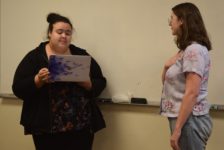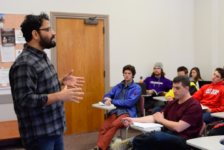
Westminster senior Levi Barrett (far right) moderates a sex positive panel with Ocean Candler, Amp Somers, Michael Sanders and Dr. Amy Foley (left to right) as part of the Bastian Lecture Series on March 23 from 7:30 to 9 p.m. Candler, a sophomore studying public health, said she thought the week was a great way to create a habitable space for students to talk about sex. Photo by Mauri Martinez.
Though classroom conversations about sex often center on its consequences of sex, professors and students said Westminster College’s Sex Positive Week, held March 20-24, offered a way for the campus community to start and engage in conversations about sex positive activism.
Sean Desilets, a film studies professor at Westminster, said sex positive activism is “an attempt to overcome the negative attitude about sexuality that pervades our culture. It is the sense that people have sex in a bunch of different ways for a bunch of different reasons and that should be acknowledged and celebrated and taken seriously.”
Desilets said activism has an important role in informing individuals about all the different aspects of sex and sexuality.
“If people don’t have access to basic information about what sex is, about the multiple ways that people practice sex [and] about the risks and pleasure of sex, you’ve got a situation of dangerous ignorance,” he said. “College students are going to have sex—obviously— and that’s good and ought to be celebrated. But having them do that without an understanding of all the giant set of things that sexuality involves is really dangerous. Sex positive activists are working hard to overcome that, particularly in this state or other conservative states.”
Ocean Candler, a sophomore public health major, said sex positive activism plays an important role in college environments, especially for students who might not have received comprehensive sex education.
“I think for most teenagers and most people starting college who were born and raised in Utah, they get to this Title IX seminar and all you hear about is sexual assault and you might not even know about sexual health,” Candler said “I think that having to this catch up during orientation is very problematic and it’s really hard.”
This lack of information about sexual health leaves out a lot of aspects of sex positive activism, according to Westminster English professor Eileen Chanza Torres.
“We go from not talking to you about sex from K-12 to jumping to rape and sexual assault,” Chanza Torres said. “I think what that leaves out is the discussion of pleasure, and I think that is extremely important because without pleasure or without discussing that aspect of pleasure—also recognizing folks who are asexual and do not feel sexual attraction—without the discussion of ‘How do we engage with each other sexually in positive safe ways?’ then all you have is either silence, which is violent, or sexual assault, which is also violent.”
Though the dangers associated with sex are important to discuss, sociology professor Kristjane Nordmeyer said sex positive activism places equal importance on the pleasures.
“When we talk about a sex positive approach to sexuality, it tends to be based on pleasure,” Nordmeyer said. “We hear a lot about the dangers of sexuality, but there’s a lot less room within academia for talking about the pleasure. Knowing about your bodies and knowing about pleasure is what keeps you happy and safe.”
Nordmeyer also said it’s especially important to start conversations surrounding sex positivism for college students.
“We absolutely needed to start the conversation, and we also need to keep it going,” Nordmeyer said. “I thought the presenters did a fantastic job of thinking through these issues of identities, marginalities [and] power and in far more thoughtful ways than most people do. These are people, like Dr. Amy Foley, that spend their lives studying this work. They are really fully invested in thinking about what it means in these communities and they’re providing a service to all of us.”
Levi Barrett, a senior sociology major, said one of Foley’s contributions to Westminster’s Sex Positive Week was to start a conversation about habitable spaces.
“Habitable space is taking the idea of ‘safe spaces’—because there is no way to guarantee a safe space—and it is more so focusing on how to make spaces habitable,” said Levi Barrett, a senior sociology major. “That takes a lot of things into account, like queer politics, queer activism, dismantling racism [and] dismantling patriarchy to make sure people feel comfortable in spaces. Because there’s no way to make people feel safe, unfortunately.”
This idea of habitable spaces needs to be present at Westminster for students to talk about sex positive activism, Candler said, stressing room for growth on campus.
“I think it is very important creating that habitable space for students to ask questions and feel comfortable talking about sex,” Candler said.









